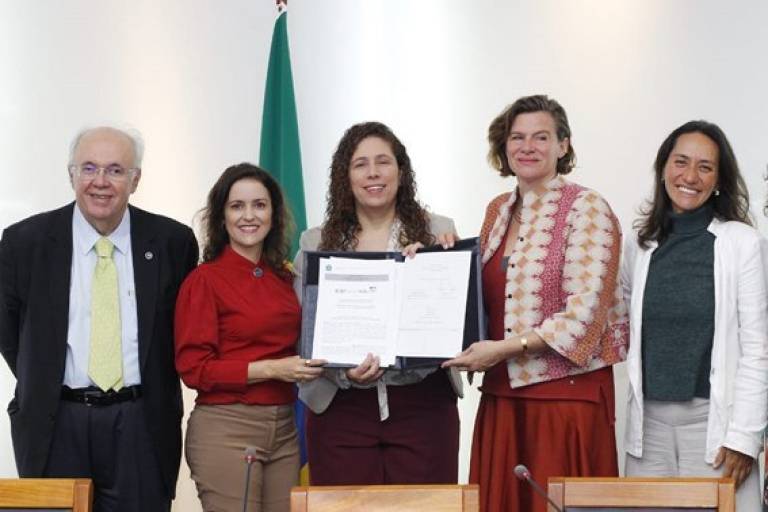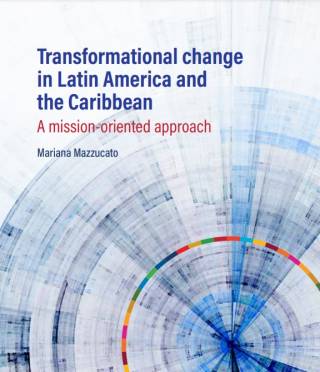UCL IIPP launches collaboration to implement Brazilian Government transformative agenda
27 July 2023
Brazilian Ministry of Management and Innovation, National School of Public Administration (ENAP) and the UCL Institute for Innovation and Public Purpose sign an agreement to promote state capacities in Brazil to promote inclusive and sustainable economic growth.

Professor Mariana Mazzucato, author of Mission Economy: a moonshot guide to changing capitalism, and her team at the UCL Institute for Innovation and Public Purpose (IIPP), are exploring a collaboration with the Government of Brazil on its ambitious agenda for economic transformation - including its mission-oriented industrial strategy and ecological transition plan - and on how to build the public sector capabilities needed to implement this agenda.
As part of this collaboration, IIPP has signed an agreement Thursday, July 25, 2023 with the Ministry of Innovation and Public Service Innovation (MGI) and the National School of Public Administration (ENAP) to support the development of a public sector capabilities strategy. This collaboration seeks to bring new economic thinking to the centre of the Brazilian government, and to inform the development of capabilities, tools, and institutions to improve state management and promote inclusive and sustainable economic growth.
This transformation requires a shift in the government's role, from correcting market failures to shaping markets through outcomes-oriented policies. Missions provide a clear direction for innovation, investment and growth that is aligned with tackling society-wide challenges. This transformation also requires a different approach to collaboration between the public and private sectors, oriented around shared goals and aimed at maximizing public value.
The project will be structured around six priority areas: public sector innovation, state capacity development, digital transformation, institutional design, state-owned enterprises, and public procurement. These action areas will be developed within the context of three strategic pillars: capacity development in the public sector; institutional design; and the design of public policy tools.
Separately, the project will include the development of an applied learning program for civil servants aimed at building the capacity and capabilities needed to translate new economic thinking into practice, based on IIPP’s ground-breaking curriculum.

This project builds on Professor Mazzucato’s previous work in Brazil and in the region. Her ideas on utilizing public procurement as a driver of development, innovation and industrial strategy, and the importance of the health industrial complex have provided the conceptual basis for the recently launched Brazilian Industrial Policy and the revival of the Brazilian National Council for Industrial Development. Specifically, the project builds on the report Professor Mazzucato wrote for the UN’s Economic Commission for Latin America and the Caribbean (ECLAC) in 2022 on Transformational Change in Latin America and the Caribbean: A mission-oriented approach. The partnership also receives the support of international organizations such as CEPAL and the Open Society Foundations, as well as Brazilian organizations like Instituto República.
UCL Institute for Innovation and Public Purpose (IIPP)
The mission of the Institute for Innovation and Public Purpose (IIPP) at University College London (UCL) is to change how public value is imagined, practiced and evaluated to tackle societal challenges —delivering economic growth that is innovation-led, sustainable and inclusive. Growth has not only a rate but also a direction: IIPP confronts this directionality head on. Finding solutions to global challenges requires purposeful organisations to collaborate in fundamentally new ways —across the state, businesses and civil society. Together, they can help reshape markets to produce growth that delivers public value. Building symbiotic eco-systems requires new tools and new forms of collaboration. IIPP rethinks the role of the state in these collaborations. Rather than just a market-fixer, it can be an active co-creator of value. A mission-oriented approach can be used to set inspirational goals, with dynamic tools —from procurement to prize schemes— to nurture bottom-up experimentation and exploration across different sectors. IIPP’s research and teaching helps create the new economic thinking and practical tools to make this a reality. IIPP is a department within University College London (UCL) —founded in 1826 to solve grand challenges— and part of The Bartlett faculty, known internationally for its radical thinking about space, design and sustainability.
Professor Mariana Mazzucato

She is winner of international prizes including the Grande Ufficiale Ordine al Merito della Repubblica Italiana in 2021, Italy's highest civilian honour, the 2020 John von Neumann Award, the 2019 All European Academies Madame de Staël Prize for Cultural Values, and the 2018 Leontief Prize for Advancing the Frontiers of Economic Thought. She was named as one of the '3 most important thinkers about innovation' by The New Republic, one of the 50 most creative people in business in 2020 by Fast Company, and one of the 25 leaders shaping the future of capitalism by WIRED. Most recently, Pope Francis appointed her to the Pontifical Academy for Life for bringing “more humanity” to the world.
She is the author of four highly-acclaimed books: The Entrepreneurial State: debunking public vs. private sector myths (2013) which investigates the critical role the state plays in driving growth; The Value of Everything: making and taking in the global economy (2018) which looks at how value creation needs to be rewarded over value extraction; Mission Economy: a moonshot guide to changing capitalism (2021) which rethinks the capacity and role of government within the economy and society; and most recently The Big Con: How the Consulting Industry Weakens our Businesses, Infantilizes our Governments and Warps our Economies (2023).
She advises policy makers around the world on innovation-led inclusive and sustainable growth. Her roles include being Chair of the World Health Organization's Council on the Economics of Health for All, Co-Chair of the Global Commission on the Economics of Water, Co-Chair on the Council on Urban Initiatives, member of the South African President’s Economic Advisory Council, the UN High Level Advisory Board for Economic and Social Affairs, the European Space Agency’s High-Level Advisory Group on Human and Robotic Space Exploration for Europe, Argentina’s Economic and Social Council and Vinnova’s Advisory Panel in Sweden and the OECD High-Level Advisory Panel on Climate and Economic Resilience. Previously, through her role as Special Advisor for the EC Commissioner for Research, Science and Innovation (2017-2019), she authored the high-impact report on Mission-Oriented Research and Innovation in the European Union, turning “missions” into a crucial new instrument in the European Commission’s Horizon innovation programme, and more recently, authored a report with the UN’s Economic Commission for Latin America and the Caribbean (ECLAC) on Transformational Change in Latin America and the Caribbean: A mission-oriented approach.
 Close
Close

